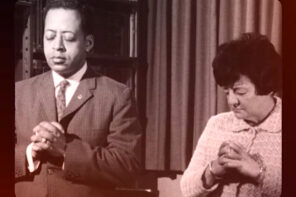What does it mean when Christians talk about being saved, or being redeemed? And why would a self-described Christian atheist want to study theology? Recently, I caught up with theologian and philosopher Adam Kotsko to find out. In the conversation below we talk about his most recent book—an examination of the the Christian tradition that speaks to everything from atonement theory, capitalism as “the empire of sin,” and what it means to leave God in place, but leave religion behind.
Emily Manuel: So in Politics of Redemption, you outline a new take on atonement theory. First, you could explain for some our readers who aren’t Christian what atonement means, theologically?
Adam Kotsko: Well, atonement theory is kind of an umbrella term for a range of theories about how Christ’s incarnation is relevant to our salvation. The meaning of Incarnation for man is generally in atonement, the most commonly-held theory of which is that Christ represents a sacrifice that atones for human sinfulness.
This is religion as a form of ransom, one life for another?
Yeah.
Why does God solicit sacrifice in the Jewish and Christian traditions? What does He get out of it?
Well one of the most influential understandings of atonement is Anselm. He says that sacrifice is about showing God honor, that we must owe him obedience. When we aren’t obedient to him, that’s a sign of disrespect; and God must somehow show that he is to be taken seriously, and so we need to make restitution for the fact that we’ve dishonored him. Not a particularly attractive theory, and it’s one I’ve been very critical of, so I’ve tried to come up with an alternative.
In contrast, you seek to make atonement a social-relational bond. What do you mean by that?
For me, the only reason that it can make sense for Christ’s actions to have effects that spread to the rest of the human race is if we’re all connected in some basic-level way. So this is the logic of all of the different theories in the tradition that I surveyed: from Anselm’s theory where Christ becomes a human being in order to pay the price and satisfy God’s honor, to the other major one which is the patristic theory where Christ came to set the human race free from its bondage to the Devil.
In all those cases, a kind of force that makes it work is that Christ as a human being is connected to the rest of the human race. What I’m trying to counter against is the tendency to interpret this in a very individualistic way, where it’s almost as though Christ’s death creates some kind of salvation slush fund that each individual has to appropriate in some way through confessing their faith and so on.
There’s also the predestination theory that God has chosen in advance who will reach salvation. And my position is that the individualistic theories basically make no sense. It makes things fundamentally arbitrary, so the social-relational reading makes it more coherent.
This seems, as you point out, to have a superficial resemblance to New Age ideas of “everything being connected.” How do we avoid such platitudes?
Well, I think that you have to avoid being satisfied with platitudes. On a base level, the New Age idea that everything is connected is obviously true but I’m not sure that the content they provide is very convincing. I want to emphasize that things are connected in particular ways, and we can judgments about whether those ways of connection are helpful or harmful. The thing that the Christian approach to this question that I’m trying to develop, what it brings to the table is a kind of historical consciousness of the way our relationships to each other have evolved over time.
Individualism really is a huge target of your critique. What do you think about the alliance of the religious Right with really individualist forms of capitalist libertarianism?
I think that many liberal Christians will offer these throw-away lines like, “well the Bible says we should care for the poor,” so it should be obvious that conservatives are contradicting the teachings of Jesus. And I agree with liberal Christians’ priorities, but I think that on a deeper level it’s doomed to be unconvincing to those rightwing Christians because they are so thoroughly individualistic.
And they can view the capitalist system as a way of picking out who is virtuous and who is hardworking, etc. I feel like there’s a conceptual correspondence that people don’t realize between conservative and very highly individualistic ideas, those kind of pro-market, pro-capitalism forms of Christianity.
If I were to think of a use that I would want my book to be put to, it’s to try to provide for anti-capitalist Christians a more theologically robust response to that kind of thing, something that goes beyond proof-texting and presents a more convincing theological argument.
Ideas of collective organization for some on the Right appear to not only be off the table politically, but as Sarah Posner has pointed out here at Religion Dispatches, idolatrous to boot.
Yeah, definitely. The distrust of collective action through the government and its tyranny—and, as you say, idolatry. They’ll caricature liberals as though they’re worshiping the government, which I don’t think is very revealing.
You talk in the book about critiques of atonement by feminist and womanist theologians. Can you explain the problem, and how you chart a path out of it?
At the core, the feminist and womanist critique of traditional accounts of atonement is of the way those accounts tend to promote suffering as something that’s inherently redemptive—and to valorize submission and obedience in a way that is obviously destructive when it’s applied unjustly to women. They include accounts of women who were abused by men who justified their actions by saying that in order to be Christ-like, women need to be submissive.
The way I tried to chart a way past this—and I do agree with the feminist critique of suffering—the way I try to understand it in my own framework is that our understanding suffering this way is reductive. It’s an abstract notion that takes suffering out of its context and basically treats all suffering as though it’s equivalent to freely assumed suffering by a nonviolent protestor. We can never say suffering is inherently one thing, it always takes place within a certain context that determines what its language should be.
There should be more recognition of the damage that language of redemption brings to people’s lives too.
Does that mean we should evaluate suffering on a case-by-case basis?
Yes, we need to respond to concrete circumstances and particular cases.
Can you talk a bit about how you imagine sin in this reading?
Basically, in my final chapter, I tried to create a contemporary theory of atonement which I’ve grown out of the tradition; I replace the concept of sin with possessiveness, and then contrast this to the free sharing of enjoyment. I guess in political terms you could so that I’m contrasting capitalism with communism, where capitalism would be the empire of sin.
Is there a link there between enjoyment and the way that queer theory imagines desire?
I’m not sure of the relationship to queer theory. I try to distinguish between enjoyment as a straightforward concept and enjoyment as a legal term, meaning that you have the use of something without owning it. So obviously enjoyment and desire are not incompatible with possessiveness. From what I understand, queer theorists try to point towards an enjoyability, cut loose from the jealousy and possessiveness that structure a traditional heterosexual relationship.
It’s interesting to me that so many post-structuralist thinkers are a bit suspicious of pleasure, which is banal, next to the shattering experience that the sublime of jouissance is supposed to bring…
Yes definitely.
In some ways you seem to be collapsing the two?
Most of our pleasures are structured according to the regime of possession. Enjoyment, as I speak about it, could be disruptive of that—but it doesn’t have be this shattering experience, we don’t have to fetishize that kind of thing. I think there’s an enjoyment that comes from just knowing something, being fascinated with somebody or something, that doesn’t require possession, that doesn’t require that everything about me be shattered.
One of the interesting things I’ve found from reading your blog is that you are in fact an atheist. What relevance do you see this theory having for atheists?
Well, first I want to hedge on this atheist question in some way, and say I’m not a traditional theist; but if I’m an atheist, I’m at least a Christian one.
In any case though, I think that a lot of work by secular philosophers recently has been reclaiming the Christian tradition, and theological concepts, that provides some prima facie evidence for its relevance—people like Slavoj Zizek or Alain Badiou or Georgio Agamben. My work’s been very influenced by them as a way to reclaim the Christian heritage in a more convincing way than simply rejecting it because it has religiousness all over it.
At one point theologian Thomas Altizer posted on your blog that we haven’t really thought through a proper atheism yet.
Right. I think that you can see this with the New Atheists. Dawkins’ and Hitchens’ and Dennett’s books are a kind of simplistic critique of religion that’s basically not going to change anyone’s mind. I think there has to be more to say about religion other than the fact that it makes no sense as an empirical claim. That’s just too obvious to be interesting. I think that we as a society deserve a better form of atheism.
Another of the interesting moves you make is you effectively leave the anthropomorphic God “in place,” which is a definite contrast to the attempts to deconstruct the God of metaphysics in the work of philosophers like Jean-Luc Marion and Richard Kearney. What was the rationale for leaving God in place?
I took my cue from Dietrich Bonhoeffer, who has argued that we have to accept the metaphysical parts of Christianity. This is against the work of Bultmann who in his reading attempts to rehabilitate Christianity by cutting out the bits that seem credible to contemporary people.
Bonhoeffer says basically to leave the myth in place, but what we need to do is remove the religious framework through which we interpret it. So we’re not necessarily talking about God, we’re talking about human beings. My reading is relevant to our concerns in our world, and not primarily about salvation or the Church. I object to the de-mythologizing approach in that it’s fundamentally arbitrarily and that it always has Christianity and theology in retreat. It’s trying to be acceptable to a liberal audience, and it’s doomed to be unpersuasive. You’re basically admitting what you’re saying is irrelevant. So I think preserving the text as is but with a different framework is a better approach.
So is it possible to have atonement if we deconstruct the idea of God?
I think it’s possible to have redemption, and have change and transformation in the way we relate to the world and each other. I don’t think that requires God.
What are you working on next?
My next major project is going to be a book about the Devil, it’s one of the major themes that came up unexpectedly in the reception of this book. I’m thinking specifically about the ways that the Christian tradition uses the Devil as a political symbolism, the Prince of this world.




